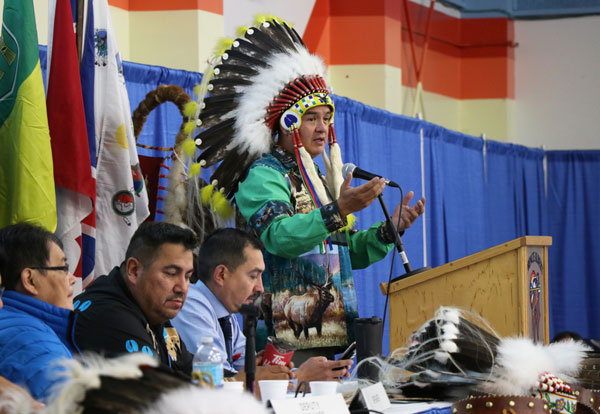The Federation of Sovereign Indigenous Nations (FSIN) is concerned about the spread of COVID-19 in Saskatchewan’s most isolated communities.
Along with Fond du Lac and Black Lake First Nations, the FSIN is calling on the provincial government and Saskatchewan and Athabasca Health Authorities to ensure health care workers serving the north are abiding by preventive measures.
The groups are also demanding more personal protective equipment (PPE).
“We must be at the table with Premier Scott Moe and the Saskatchewan Health Authority to come up with ways of working to fight this pandemic together” said FSIN Chief Bobby Cameron.
“We contribute millions to the economy every year, but we are not at these meetings. We must work together to stop the spread of COVID-19 and flatten the curve.”
Following a confirmed COVID-19 case on Friday, Fond du Lac First Nation Chief Louie Mercredi voiced that a provincial health nurse is responsible for spreading the virus to the north.
According to a Saturday news release, the nurse drove up to Stony Rapids last Sunday and began treating several vulnerable patients in hospital the next day.
“We have done all that we can do at the First Nations level to keep our people safe, including putting self-isolation measures on those flying or driving into our communities. However, the provincial government’s health care employees are not abiding by those measures” said Fond du Lac First Nation Chief Louie Mercredi.
“This infection was caused by provincial health care staff that were not tested before coming into our nations, they must ensure that our people are protected at all costs, as they will be held liable if this infection is not contained and continues to spread.”
As of Monday, Saskatchewan’s far north has seven cases of COVID-19. Two of them have recovered.
The area lingered at three cases stemming from early on in the spread across the province. It’s since spiked starting on Apr. 7, when the province reported a fourth case in the region.
“We have more questions than answers and my community members are scared. We are being told this nurse was working in Saskatoon prior to coming north. Why wasn’t this nurse tested before they were exposed to our patients?” questioned Black Lake First Nation Chief Coreen Sayazie in the release.
Dr. Rim Zayed is the Chief Medical Health Officer for the Athabasca Health Authority. She joined Moe and the province’s Chief Medical Health Officer Dr. Saqib Shahab for a COVID-19 update on Monday.
“The screening protocols for health care workers in the Athabasca Health Authority in the north is no different than those being utilized elsewhere in the health care system. Each health care worker goes through the screening and if they start to show symptoms at work, in the north or anywhere else, they need to isolate and be tested,” she said.
Zayed said she’s also “quite confident” in the health authority’s contact tracing process.
The Saskatchewan Health Authority is implementing further measures for health care workers to reduce the spread of COVID-19. CEO Scott Livingstone said they’ll be in action this week.
These measures include mandatory screening, which involves temperature checks, before and after shifts, minimizing staff movement between facilities and continuous masking to protect against asymptomatic spread.
FSIN Vice Chief David Pratt said more educational opportunities, including medical training, should be offered in First Nations communities. That way when a pandemic or other health crisis surfaces, he said, those in isolated areas aren’t put at further risk from outside staff coming in.
Last week, the Northern Inter-Tribal Health Authority also voiced concerns about a lack of PPE in the north. It said 40 per cent of its health care sites don’t have the proper equipment to respond to the pandemic.
In response, the Ministry of Health said the federal government has been shipping PPE, but not in the quantities ordered. The statement also said the SHA provided testing swabs to the health authority to address immediate needs.


